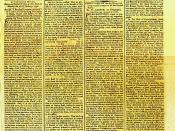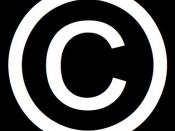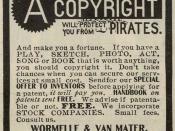Who is, and who should be, the principle beneficiary of English copyright law: authors and performers, those involved in the commercial exploitation of copyright works, or the general public?
The purpose of copyright is to allow creators to gain economic rewards for their efforts and so encourage future creativity and the development of new material which benefits us all .
Introduction
In answering this question, I will first examine the current position of English copyright law in how it benefits exploiters, authors and performers, and those involved in the commercial exploitation of copyright works. Then I will argue that author is, and should be, the principle beneficiary of English copyright law.
In this essay, I will use the term "publishers" as a general term meaning those organisations and companies involving in commercial exploitation of copyright work, such as publishers and record companies. Authors, unless that area presents a distinction between the two, may mean both authors and performers.
Any reference to "copyright law" should be regarded as such law of England.
How the law benefits exploiters?
It is sometimes thought that English copyright law is primarily commercial in nature. Traditionally copyright laws in England, contrary to those in the continental systems, put emphasis in the economic rights of the copyright owners. Only recently moral rights are introduced in the Copyright, Designs and Patents Act (CDPA) 1988 .
As its nature, economic rights are directly beneficial to exploiters. Economic rights include a bundle of rights that are enjoyed by copyright owners. The CDPA gives copyright owners exclusive rights to do "restricted acts" , and they have the right to sue those who do such restricted acts without their consent (infringers) . These restricted acts included basically all the commercially profitable acts, like public performance and renting or lending...


